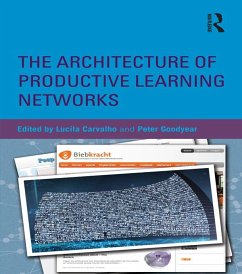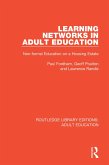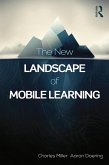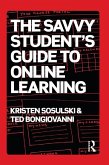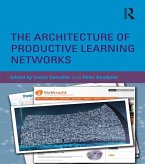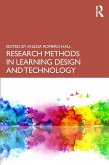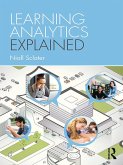42,95 €
42,95 €
inkl. MwSt.
Sofort per Download lieferbar

21 °P sammeln
42,95 €
Als Download kaufen

42,95 €
inkl. MwSt.
Sofort per Download lieferbar

21 °P sammeln
Jetzt verschenken
Alle Infos zum eBook verschenken
42,95 €
inkl. MwSt.
Sofort per Download lieferbar
Alle Infos zum eBook verschenken

21 °P sammeln
- Format: PDF
- Merkliste
- Auf die Merkliste
- Bewerten Bewerten
- Teilen
- Produkt teilen
- Produkterinnerung
- Produkterinnerung

Bitte loggen Sie sich zunächst in Ihr Kundenkonto ein oder registrieren Sie sich bei
bücher.de, um das eBook-Abo tolino select nutzen zu können.
Hier können Sie sich einloggen
Hier können Sie sich einloggen
Sie sind bereits eingeloggt. Klicken Sie auf 2. tolino select Abo, um fortzufahren.

Bitte loggen Sie sich zunächst in Ihr Kundenkonto ein oder registrieren Sie sich bei bücher.de, um das eBook-Abo tolino select nutzen zu können.
The Architecture of Productive Learning Networks explores the characteristics of productive networked learning situations and, through a series of case studies, identifies some of the key qualities of successful designs.
- Geräte: PC
- mit Kopierschutz
- eBook Hilfe
- Größe: 3.74MB
Andere Kunden interessierten sich auch für
![Learning Networks in Adult Education (eBook, PDF) Learning Networks in Adult Education (eBook, PDF)]() Paul FordhamLearning Networks in Adult Education (eBook, PDF)33,95 €
Paul FordhamLearning Networks in Adult Education (eBook, PDF)33,95 €![The New Landscape of Mobile Learning (eBook, PDF) The New Landscape of Mobile Learning (eBook, PDF)]() The New Landscape of Mobile Learning (eBook, PDF)47,95 €
The New Landscape of Mobile Learning (eBook, PDF)47,95 €![The Savvy Student's Guide to Online Learning (eBook, PDF) The Savvy Student's Guide to Online Learning (eBook, PDF)]() Kristen SosulskiThe Savvy Student's Guide to Online Learning (eBook, PDF)30,95 €
Kristen SosulskiThe Savvy Student's Guide to Online Learning (eBook, PDF)30,95 €![The Architecture of Productive Learning Networks (eBook, ePUB) The Architecture of Productive Learning Networks (eBook, ePUB)]() Lucila CarvalhoThe Architecture of Productive Learning Networks (eBook, ePUB)42,95 €
Lucila CarvalhoThe Architecture of Productive Learning Networks (eBook, ePUB)42,95 €![Research Methods in Learning Design and Technology (eBook, PDF) Research Methods in Learning Design and Technology (eBook, PDF)]() Research Methods in Learning Design and Technology (eBook, PDF)42,95 €
Research Methods in Learning Design and Technology (eBook, PDF)42,95 €![Producing Video For Teaching and Learning (eBook, PDF) Producing Video For Teaching and Learning (eBook, PDF)]() Michael O'DonoghueProducing Video For Teaching and Learning (eBook, PDF)39,95 €
Michael O'DonoghueProducing Video For Teaching and Learning (eBook, PDF)39,95 €![Learning Analytics Explained (eBook, PDF) Learning Analytics Explained (eBook, PDF)]() Niall SclaterLearning Analytics Explained (eBook, PDF)34,95 €
Niall SclaterLearning Analytics Explained (eBook, PDF)34,95 €-
-
-
The Architecture of Productive Learning Networks explores the characteristics of productive networked learning situations and, through a series of case studies, identifies some of the key qualities of successful designs.
Dieser Download kann aus rechtlichen Gründen nur mit Rechnungsadresse in A, B, BG, CY, CZ, D, DK, EW, E, FIN, F, GR, HR, H, IRL, I, LT, L, LR, M, NL, PL, P, R, S, SLO, SK ausgeliefert werden.
Produktdetails
- Produktdetails
- Verlag: Taylor & Francis eBooks
- Seitenzahl: 312
- Erscheinungstermin: 14. März 2014
- Englisch
- ISBN-13: 9781135070182
- Artikelnr.: 40823704
- Verlag: Taylor & Francis eBooks
- Seitenzahl: 312
- Erscheinungstermin: 14. März 2014
- Englisch
- ISBN-13: 9781135070182
- Artikelnr.: 40823704
- Herstellerkennzeichnung Die Herstellerinformationen sind derzeit nicht verfügbar.
Lucila Carvalho is a Postdoctoral Research Associate in the CoCo Research Centre at the University of Sydney, Australia. Her PhD combined research in design, learning technology and the sociology of knowledge. She has studied and carried out research in Australia, New Zealand, the UK and Brazil. She has presented her work at various international conferences in the fields of education, sociology, systemic functional linguistics, design and software engineering.
Peter Goodyear is Professor of Education, Australian Laureate Fellow and Co-Director of the CoCo Research Centre at the University of Sydney, Australia. He has been carrying out research in the field of learning and technology since the early 1980s, working in the UK, Europe and Australia. He has published eight books and over 100 journal articles and book chapters.
Peter Goodyear is Professor of Education, Australian Laureate Fellow and Co-Director of the CoCo Research Centre at the University of Sydney, Australia. He has been carrying out research in the field of learning and technology since the early 1980s, working in the UK, Europe and Australia. He has published eight books and over 100 journal articles and book chapters.
Part One: Foundations
1 Introduction: networked learning and learning networks
Peter Goodyear and Lucila Carvalho
2 Productive learning networks: the evolution of research and practice
Peter Goodyear
3 Framing the analysis of learning network architectures
Peter Goodyear and Lucila Carvalho
Part Two: Learning Networks
4 Peep: peer support for programing
Lucila Carvalho, Peter Goodyear, Dewa Wardak and Rob Saunders
5 Creating a peer-driven learning network in higher education - using Web
2.0 tools to facilitate online dialogue and collaboration
Hanne Westh Nicolajsen and Thomas Ryberg
6 Professional learning and a national community of practice for teachers
leading local curriculum change
Lynn Robinson and Jaime Metcher
7 One Laptop Per Child (OLPC): a small computer to serve a big cause
Martin Parisio, Kate Thompson, Tracy Richardson and Rangan Srikhanta
8 Diseña el Cambio: helping Mexican school children to design a better
world
Crighton Nichols and David Ashe
9 Biebkracht: library professionals empowered through an
inter-organizational learning network - design principles and evolution
Marlies Bitter-Rijpkema, Steven Verjans, Wim Didderen and Peter Sloep
10 Qstream: learning in the 'in-between'
David Ashe, Pippa Yeoman and Tim Shaw
11 ISQua Knowledge: fostering a sense of community for the emerging field
of quality in health care
Dewa Wardak, Paul Parker and Tim Shaw
12 The Synaptic Leap: open science combating disease
Paul Parker, Beat Schwendimann, Kate Thompson and Matthew Todd
13 Virtual Choir: sharing experiences of singing together apart
Lucila Carvalho and Peter Goodyear
14 iSpot: your place to share nature
Ana Pinto, Kate Thompson, Chris Jones, and Doug Clow
15 Utilizing informal teacher professional development networks using the
Network Awareness Tool
Maarten de Laat, Bieke Schreurs and Rory Sie
Part Three: Synthesis
16 Synthesis: set design, epistemic design and the functioning of learning
networks
Lucila Carvalho and Peter Goodyear
Contributors
Index
1 Introduction: networked learning and learning networks
Peter Goodyear and Lucila Carvalho
2 Productive learning networks: the evolution of research and practice
Peter Goodyear
3 Framing the analysis of learning network architectures
Peter Goodyear and Lucila Carvalho
Part Two: Learning Networks
4 Peep: peer support for programing
Lucila Carvalho, Peter Goodyear, Dewa Wardak and Rob Saunders
5 Creating a peer-driven learning network in higher education - using Web
2.0 tools to facilitate online dialogue and collaboration
Hanne Westh Nicolajsen and Thomas Ryberg
6 Professional learning and a national community of practice for teachers
leading local curriculum change
Lynn Robinson and Jaime Metcher
7 One Laptop Per Child (OLPC): a small computer to serve a big cause
Martin Parisio, Kate Thompson, Tracy Richardson and Rangan Srikhanta
8 Diseña el Cambio: helping Mexican school children to design a better
world
Crighton Nichols and David Ashe
9 Biebkracht: library professionals empowered through an
inter-organizational learning network - design principles and evolution
Marlies Bitter-Rijpkema, Steven Verjans, Wim Didderen and Peter Sloep
10 Qstream: learning in the 'in-between'
David Ashe, Pippa Yeoman and Tim Shaw
11 ISQua Knowledge: fostering a sense of community for the emerging field
of quality in health care
Dewa Wardak, Paul Parker and Tim Shaw
12 The Synaptic Leap: open science combating disease
Paul Parker, Beat Schwendimann, Kate Thompson and Matthew Todd
13 Virtual Choir: sharing experiences of singing together apart
Lucila Carvalho and Peter Goodyear
14 iSpot: your place to share nature
Ana Pinto, Kate Thompson, Chris Jones, and Doug Clow
15 Utilizing informal teacher professional development networks using the
Network Awareness Tool
Maarten de Laat, Bieke Schreurs and Rory Sie
Part Three: Synthesis
16 Synthesis: set design, epistemic design and the functioning of learning
networks
Lucila Carvalho and Peter Goodyear
Contributors
Index
Part One: Foundations
1 Introduction: networked learning and learning networks
Peter Goodyear and Lucila Carvalho
2 Productive learning networks: the evolution of research and practice
Peter Goodyear
3 Framing the analysis of learning network architectures
Peter Goodyear and Lucila Carvalho
Part Two: Learning Networks
4 Peep: peer support for programing
Lucila Carvalho, Peter Goodyear, Dewa Wardak and Rob Saunders
5 Creating a peer-driven learning network in higher education - using Web
2.0 tools to facilitate online dialogue and collaboration
Hanne Westh Nicolajsen and Thomas Ryberg
6 Professional learning and a national community of practice for teachers
leading local curriculum change
Lynn Robinson and Jaime Metcher
7 One Laptop Per Child (OLPC): a small computer to serve a big cause
Martin Parisio, Kate Thompson, Tracy Richardson and Rangan Srikhanta
8 Diseña el Cambio: helping Mexican school children to design a better
world
Crighton Nichols and David Ashe
9 Biebkracht: library professionals empowered through an
inter-organizational learning network - design principles and evolution
Marlies Bitter-Rijpkema, Steven Verjans, Wim Didderen and Peter Sloep
10 Qstream: learning in the 'in-between'
David Ashe, Pippa Yeoman and Tim Shaw
11 ISQua Knowledge: fostering a sense of community for the emerging field
of quality in health care
Dewa Wardak, Paul Parker and Tim Shaw
12 The Synaptic Leap: open science combating disease
Paul Parker, Beat Schwendimann, Kate Thompson and Matthew Todd
13 Virtual Choir: sharing experiences of singing together apart
Lucila Carvalho and Peter Goodyear
14 iSpot: your place to share nature
Ana Pinto, Kate Thompson, Chris Jones, and Doug Clow
15 Utilizing informal teacher professional development networks using the
Network Awareness Tool
Maarten de Laat, Bieke Schreurs and Rory Sie
Part Three: Synthesis
16 Synthesis: set design, epistemic design and the functioning of learning
networks
Lucila Carvalho and Peter Goodyear
Contributors
Index
1 Introduction: networked learning and learning networks
Peter Goodyear and Lucila Carvalho
2 Productive learning networks: the evolution of research and practice
Peter Goodyear
3 Framing the analysis of learning network architectures
Peter Goodyear and Lucila Carvalho
Part Two: Learning Networks
4 Peep: peer support for programing
Lucila Carvalho, Peter Goodyear, Dewa Wardak and Rob Saunders
5 Creating a peer-driven learning network in higher education - using Web
2.0 tools to facilitate online dialogue and collaboration
Hanne Westh Nicolajsen and Thomas Ryberg
6 Professional learning and a national community of practice for teachers
leading local curriculum change
Lynn Robinson and Jaime Metcher
7 One Laptop Per Child (OLPC): a small computer to serve a big cause
Martin Parisio, Kate Thompson, Tracy Richardson and Rangan Srikhanta
8 Diseña el Cambio: helping Mexican school children to design a better
world
Crighton Nichols and David Ashe
9 Biebkracht: library professionals empowered through an
inter-organizational learning network - design principles and evolution
Marlies Bitter-Rijpkema, Steven Verjans, Wim Didderen and Peter Sloep
10 Qstream: learning in the 'in-between'
David Ashe, Pippa Yeoman and Tim Shaw
11 ISQua Knowledge: fostering a sense of community for the emerging field
of quality in health care
Dewa Wardak, Paul Parker and Tim Shaw
12 The Synaptic Leap: open science combating disease
Paul Parker, Beat Schwendimann, Kate Thompson and Matthew Todd
13 Virtual Choir: sharing experiences of singing together apart
Lucila Carvalho and Peter Goodyear
14 iSpot: your place to share nature
Ana Pinto, Kate Thompson, Chris Jones, and Doug Clow
15 Utilizing informal teacher professional development networks using the
Network Awareness Tool
Maarten de Laat, Bieke Schreurs and Rory Sie
Part Three: Synthesis
16 Synthesis: set design, epistemic design and the functioning of learning
networks
Lucila Carvalho and Peter Goodyear
Contributors
Index
